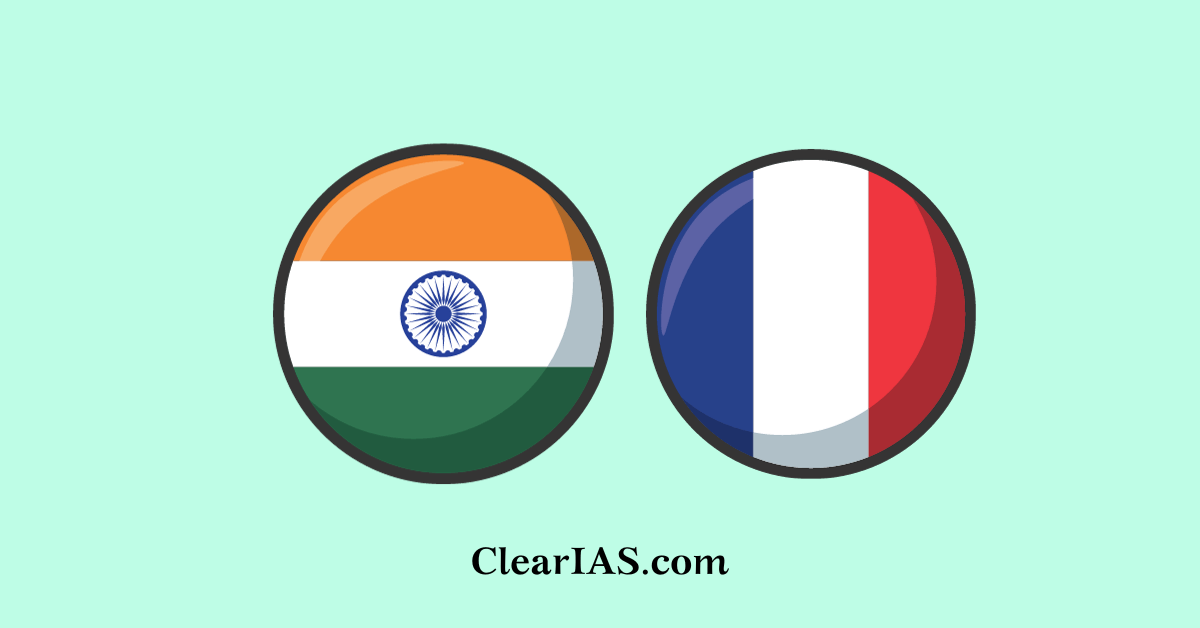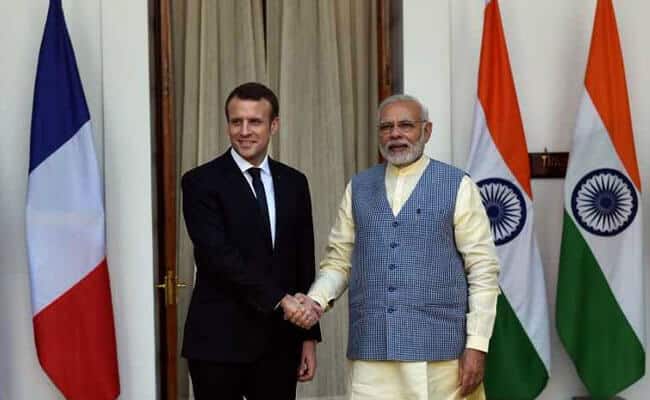 When India counts her friends in foreign relations, France occupies a special place. Both nations have a centuries-old history of trade relations. In this post, let’s analyse the new developments in India-France relations.
When India counts her friends in foreign relations, France occupies a special place. Both nations have a centuries-old history of trade relations. In this post, let’s analyse the new developments in India-France relations.
History of India-France Relations
- The French came as traders to India in the 17th century. However, they had colonial aspirations, which resulted in the ruling of certain territories like Puducherry.
- Things have changed, and colonialism has ended. Now Puducherry is a popular tourist destination for French travellers to India.
- The political, commercial and cultural contacts, then established, were maintained throughout the 19th century. Diplomatic relations between the two countries were established after the Independence of India. Since then, cooperation has developed in all the major areas.
- Though France was always sensitive to India’s claim for its unique stature in the world due to its rich civilization, the Cold War impeded the deepening of the relationship. After the Cold War, the relationship progressed through many landmark agreements like the Strategic Partnership Agreement 1998 and the Civil Nuclear Agreement 2008.
- Former French president François Hollande was the chief guest in Republic Day celebrations in 2016 thus making France the only country to be invited a record-setting 5 times to Republic Day celebrations.
- Cooperation in fields of nuclear, space, counter-terrorism, defence, urbanization, culture, etc. have grown in recent decades.
- President Emmanuel Macron’s visit in 2018 cemented the regional dimension of the strategic partnership between the two countries.
The strategic partnership between India and France
On the basis of this old bond of trust, France and India decided to take a new step by establishing a strategic partnership in 1998. With the establishment of this partnership, there has been significant progress in all areas of bilateral cooperation through regular high-level exchanges at the Head of State/Head of Government levels. The growing cooperation and exchanges include strategic areas such as defence, counter-terrorism, nuclear energy and space.
The strategic interests: background
During the Cold War time, France was weary of subordinating its foreign policy to that of the US. India was also pursuing NAM thus not succumbing to either super-powers.
After the end of the Cold War, both India and France favoured a multipolar world order as they were sceptic of US hegemony.
- France termed the US as hyper-power
- France was the first P-5 country to support Indian membership in the UNSC
- They signed a strategic partnership in 1998
- France supports India’s membership of Multilateral Export Control regimes, viz. NSG and MTCR.
- France’s support was vital in India’s accession to MTCR in 2016.
India- France: Indo-Pacific region Interests
French islands – Réunion and Mayotte in the Indian Ocean and New Caledonia and French Polynesia in the South Pacific – make France a stakeholder in the region.
- But the regional dimension to the strategic partnership remains dormant as India was reluctant to join hands with any other power, especially Western powers in the Indo-Pacific region due to its cold war legacy of NAM.
- This equation changed with the rise of Chinese clout in the region and the simultaneous decline of American hegemony in the region.
- This prompted India to look for like-minded countries to jointly spearhead the security architecture of the region.
- France, which has many littoral islands in the region, also looked for partnerships in the region to counter the volatile rise of China.
- Being middle powers and their mutual wariness to hegemonic power projection, India and France began to see each other as natural allies in the Indo-Pacific region, especially the western Indian Ocean.
- Prime Minister Modi visited France in 2017 and met President Emmanuel Macron and reiterated a strong commitment to further strengthen the India-France strategic partnership. Prime Minister Modi declared India’s unflinching commitment to the Paris Accord. This regional dimension of strategic relations was complemented by other initiatives like ISA. Amidst this background, Emmanuel Macron visited India in 2018.
India- France: Defence Cooperation
Since the 1980s defence cooperation increased as India has been looking to diversify its military procurement to reduce over-reliance on the USSR.
Major defence projects
- 36 Rafale fighter jets through government-to-government deal
- P-75 Scorpene Project: The contract for six Scorpene submarines under technology transfer. The first two submarines Kalvari and Khanderi have been built.
- Dassault Reliance Aerospace Limited (DRAL) manufacturing facility at Mihan in Maharashtra. It is a joint venture between French aerospace firm, Dassault Aviation, and India’s Reliance Group and is the first private facility for the production of Rafale fighter jets and Falcon civilian aircraft.
- Regular defence exercises; viz. Exercise Shakti (Army), Exercise Varuna (Navy), Exercise Garuda(Air Force)
India- France: Space Cooperation
- ISRO and the French Space Agency (CNES) have been cooperating for many decades.
- French launch pads are used by ISRO for their GSLVs: GSAT-17 was launched from Kourou in 2017.
- France is a major supplier of components and equipment for the Indian space programme.
India- France: Civil Nuclear Cooperation
- After the 1998 nuclear test by India, France was the major nuclear country that understood India’s security compulsions for its nuclear test.
- France worked with the US to integrate India into the global nuclear order through an India-specific waiver in NSG.
- France was the first country with which India entered into a civil nuclear agreement following the NSG waiver.
- The General Framework Agreement and the Early Works Agreement between NPCIL and AREVA for the implementation Jaitapur Nuclear Power Project (JNPP) were signed in 2010.
India- France: Other areas of cooperation

Terrorism
- After the Paris bomb attacks, both countries increased cooperation on global terrorism.
- France supports India’s proposal of a Comprehensive Convention on International Terrorism (CCIT) in the UN.
- During former President Hollande’s visit in 2016, India and France issued a Joint Statement on Counter-Terrorism in which they resolved to step up bilateral cooperation in this field.
Environment
- At the Paris Summit of UNFCC, India and France launched the International Solar Alliance (ISA) which brings together countries between the Tropic of cancer and Tropic of Capricorn for cooperation on solar energy.
- During Macron’s visit, both countries decided to form a joint working group to institutionalize cooperation in the conservation of the environment.
Urbanisation
- India and France are cooperating on developing smart cities: Chandigarh, Nagpur, and Puducherry.
Cultural Cooperation
- Indian Council for Cultural Relations regularly sends Indian cultural troupes to France.
- Presented the Namaste France cultural festival in France from 15 September to 30 November 2016.
- The French cultural festival Bonjour India in India will be conducted from November 2017 to February 2018.
Economic relation
- India’s trade relationship with the EU is mired in many roadblocks which are reflected in the stalled FTA negotiations with the EU. This inertia also affects trade relations with France.
- Trade is highly concentrated in certain niche areas like defence supplies.
- In the backdrop of Brexit, France can act as an entry point for Indian businesses in Europe.
Macron’s visit
In the vision statement on India-France relations, a free Indo-Pacific was emphasized
- France has many littoral islands in the Indo-Pacific region which makes France a major player in the region especially in the west Indian Ocean.
- The Indian navy has good relations with the US Pacific command which reaches up to the Bay of Bengal. But the US Central Command which is up to the Arabian Sea has good relations with Pakistan. Here India can partner with the French navy (according to Rakesh Sood).
- A Joint vision statement on free Indo-Pacific is aimed at countering Chinese hegemony in the region.
- This vision comes at a time when India is willing to cooperate with other like-minded countries in the Indo-Pacific region shedding its approach of viewing the region as its exclusive backyard.
- French military bases in Djibouti, Abu Dhabi, and Reunion Island can be a force multiplier for India, which itself is looking to build naval facilities in Seychelles, Mauritius, and Oman.
Emphasis on ISA, re-commitment to the Jaitapur nuclear plant, and climatic change cooperation. Narendra Modi and Emmanuel Macron inaugurated a solar power plant at Dadar Kala village in Uttar Pradesh:
- Reactions to the abdication of responsibility by the US on climate change regime.
- The leadership role in ISA is conceived as providing an alternate leadership for developing countries by challenging the current geopolitical power structure around fossil fuel.
Reciprocal logistics support b/w the armed forces:
- Message to US and Russia about restructuring strategic posture in consonance with an age-old commitment to multipolar world order.
This visit had rekindled the ambition of the two countries to chalk out a plan for a multi-polar rule-based world order.
Challenges in India-France Relations
Strategic relations
- France’s commitment to BRI is in stark contrast to India’s position on the same.
- Presently cooperation on Indo-Pacific is merely symbolic. Need deep coordination between both navies. Reciprocal logistics support is the right step in this direction.
Environment
- Thermal power is still feasible and economical than solar in India, so the International Solar Alliance (ISA) will not make much headway in the near future.
Nuclear cooperation
- The delay in the Jaitapur project is affecting future cooperation on the nuclear front.
Defence
- Delays and controversies around Rafael’s deal are affecting mutual trust between both nations.
India-France Relations: The Future…
- The India-France relationship is primarily driven by government-to-government level relations. It needs people-to-people and business-to-business relations to deepen the ties.
- French infrastructure companies are looking for opportunities in Indian projects especially in smart cities and renewable energy. India should leverage this opportunity by improving the ease of doing business.
- Model Bilateral Investment Treaty of India has drawn sharp criticism from investors, The Government should revisit this by taking into account the concerns of all the stakeholders.
- India-France should build on reciprocal logistics support agreement to deepen military ties
- 14 agreements signed during Macron’s visit covering the whole gamut of issues from space cooperation to sustainable urban development. Both countries should carry forward these commitments consistently to deepen the relationship.
Also read: India-Greece Relations
Article by: Sethu Krishnan M






hydroxychloride 200 mg https://www.pharmaceptica.com/